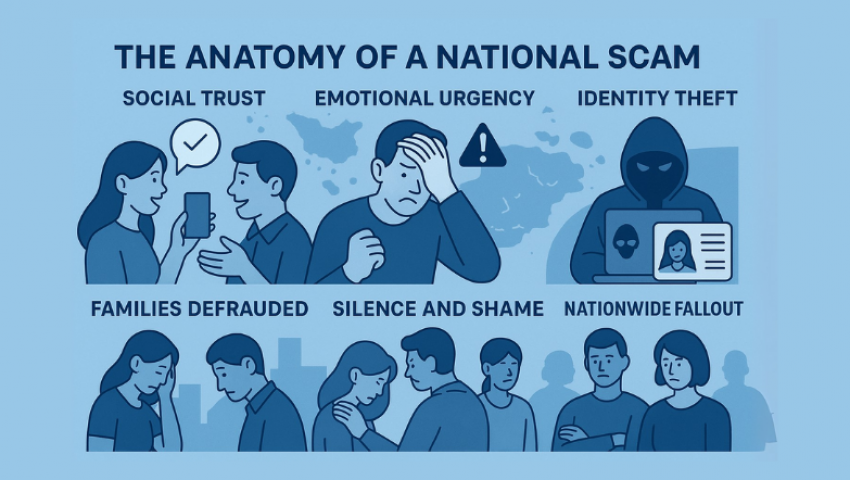
The Anatomy of a National Scam: GMCE, Identity Theft, and the Silent Collapse of Trust
GMCE didn’t just take Maldivians’ money—it stole identities, fractured families, and exploited culture. Here’s how it happened—and how to stop the next one.
It started quietly. It didn’t start with the poor. It started with the powerful.
In the early days of GMCE, Businessmen. Entrepreneurs. Local influencers. People with titles, networks, and credibility.
They formed private Telegram groups. Shared screenshots of massive returns. Boasted about withdrawals. And in doing so, they built the most dangerous part of any scam: social proof with authority.
Soon, their employees joined. Then their relatives. Then the relatives of those relatives.
What looked like a digital investment opportunity quickly became a national movement, legitimized not by regulation, but by reputation.
When it fell, entire families were entangled—not just financially, but socially. And the shame didn’t just live online. It lived in real rooms, with real consequences. When the scheme collapsed, everyone was silent—not just because they lost, but because they were ashamed to admit they believed.
And what most didn’t realize was: they weren’t just giving up money. They were handing over their identity. Their faces. Their ID cards. Their future risk.
“Not Greed—System Design”
When national scams like GMCE unravel, media and authorities often default to blame.
- “People were greedy.”
- “People should have known better.”
- “They ignored the warning signs.”
But this narrative is both cruel and incomplete.
GMCE didn’t succeed because Maldivians were naive. It succeeded because the structure of the scheme matched the structure of the society.
It tapped into:
- Tight social networks where trust moves faster than scrutiny.
- Family decision-making models that prioritize collective action over individual risk.
- A culture of respect, where questioning elders or successful peers feels wrong.
- An informal economy, where legitimate investment vehicles are scarce, and fast growth is rare.
This is the same mechanism that made Bernie Madoff’s fraud work in the U.S., and why MMM Nigeria affected over 3 million people globally. Scams don’t rely on stupidity. They rely on misused trust.
“The Shame That Silences Reform”
In tightly woven societies like the Maldives, shame operates like gravity—pulling people inward, keeping them quiet.
When someone is scammed in public, the pain isn’t just financial. It’s reputational. It's social. And because of that, people rarely speak up.
This silence becomes fertile ground for the next fraud. Because no one admits they were duped, no one learns what to watch for. The lessons die in whispers.
To counter this, we’ve piloted Narrative Rehabilitation Programs—where victims share stories anonymously, and communities debrief together. It turns shame into signal. Memory into muscle.
“They Took More Than Your Money”
Here’s the part most people missed: GMCE didn’t just ask for deposits.
It asked participants to upload:
- Their national ID card
- A selfie holding that ID
- Personal details
This wasn’t “KYC.” This was weaponized data collection.
Now, thousands of Maldivians are vulnerable to:
- Synthetic identity fraud (criminals building fake personas using real IDs)
- Loan scams in foreign jurisdictions using stolen data
- Hijacking social media accounts along with unknown ads spendings
What’s worse? Most people don’t even realize this data can live on dark web marketplaces for years. Even after GMCE disappears, your digital shadow doesn’t.
“Small Shifts That Save Lives”
Let’s look at the everyday language that enables these schemes—and how we can reframe it:
| What They Say | What You Should Say Instead | Why It Matters |
| “Everyone's doing it.” | “Who’s regulating it?” | Questions the legitimacy, not the popularity. |
| “Just try a little.” | “Small loss is still loss.” | Shrinks the appeal of low-risk lies. |
| “It worked for my cousin.” | “Can I see an audited report?” | Moves from testimonial to transparency. |
| “Don't overthink.” | “Slow is smart.” | Makes pausing feel intelligent, not weak. |
These swaps sound simple. But in practice, they give people permission to pause—and that pause breaks the scam’s momentum.
“What Institutions Can Do Now”
Whether you run a bank, a ministry, a startup—or a family board—these are four operational changes we recommend today:
1. Two-Week Cooling Periods
Force a mandatory 14 days wait before any investment over MVR 1,000. Scams feed on urgency. Slow kills them.
2. Scam Simulations in Schools and Workplaces
Just like fire drills, run fraud drills. Get people used to spotting red flags. Make it a game. Then make it muscle memory.
3. ID Protection Campaigns
No one should be sharing selfies with IDs unless the platform is licensed, encrypted, and accountable. Launch posters, school talks, and bank disclaimers.
4. Red Flag Scorecards
Create a public checklist:
- Is the source traceable?
- Are returns clearly defined?
- Is there a legal license?
Can you verify the product? If it scores under 15/20—don’t invest.
“The Numbers That Weren’t in the Brochure”
Let’s quantify the real cost.
- Estimated national losses from GMCE: Over $55 million, based on social media reports, referral structures, and informal surveys.
- Documented identity exposure: Thousands uploaded selfies + ID cards, creating one of the largest unregulated identity leaks in the region.
- Referral-based participation rate: 72% of victims joined after a personal recommendation.
- Due diligence rate: Only 11% of participants searched online for risk indicators before investing or 89% never conducted a basic search or risk analysis before funding.
The scam succeeded because it combined emotional urgency with social trust—and bypassed every rational checkpoint.
But there’s a payoff to post-scam reform.
Based on similar post-scam initiatives:
- Countries with trust friction systems see a 43% reduction in scam propagation.
- Communities that launch storytelling-based recovery programs experience 2.6x faster awareness spread compared to generic warnings.
- Schools that integrate financial deception literacy produce 44% lower scam vulnerability scores in 3 years.
The message is clear: the right changes work. But they must be engineered—not hoped for.
“What Could Have Been”
Let’s run two futures.
📉 Scenario A: What Actually Happened
- GMCE enters via social trust
- No central warning issued
- Participants recruit family and friends
- Scheme collapses
- Silence spreads
- No reform or memory retained
- Another scam rises 18 months later
📈 Scenario B: If Prevention Protocols Existed
- ID checks trigger platform warnings
- Financial institutions publish scam scoring index
- 10% of the most vocal early adopters are intercepted via community fact-checkers
- Scam still happens—but total exposure drops by 65%
- Storytelling campaigns mobilize victim recovery and cultural learning
- Next scam meets a much more skeptical audience—and fizzles
We can’t erase fraud from the planet.
But we can design an ecosystem that suffocates its reach.
“Engineering Cultural Immunity”
At Maldicore, we approach scams not as isolated events—but as systemic vulnerabilities in trust ecosystems.
We’ve worked with governments, banks, and community networks across Asia and Africa where similar scams flourished due to social design flaws.
In one case in East Africa, we helped a mobile lending platform implement a Community Trust Index—which cut scam-related user churn by 37% in six months.
In Southeast Asia, we collaborated with family business councils to create a Decision Escalation Model—forcing any investment above $500 to pass through a dual-review protocol. It didn’t prevent every scam, but it dramatically slowed their spread.
Our thesis is simple: If you can't stop scams from trying, you can make them too slow to succeed.
“Your Voice is a Firewall”
Scams don’t end with their shutdown.
They echo—in trust lost, in silence reinforced, in identities compromised.
The GMCE scheme wasn’t the first. It won’t be the last.
But it can be the turning point—if we treat it as a signal, not just a scar.
At Maldicore, we believe that the next frontier of national resilience isn’t only economic or technical. It’s cultural. It’s about trust engineering, decision literacy, and public storywork.
We invite:
- Banks to co-create ID protection PSAs
- Schools to pilot deception literacy modules
- Community leaders to normalize public conversation about scams
- Regulators to enforce referral chain disclosures for financial products
And most of all: we invite you, the reader, to share your story. Whether you joined, resisted, or warned others—say something.
Because silence is the scammer’s oxygen.
Let’s cut off the supply.
🟦 Want to be part of designing scam-resistant communities, financial trust systems, or digital fraud detection frameworks?
Maldicore offers customized consulting for governments, banks, businesses, schools, and private families to build post-scam immunity systems.
📩 Reach out. Let’s make this the last time it happens here.

Maldicore Support
Leave a comment
Your email address will not be published. Required fields are marked *

